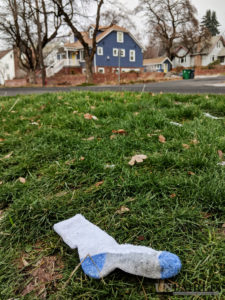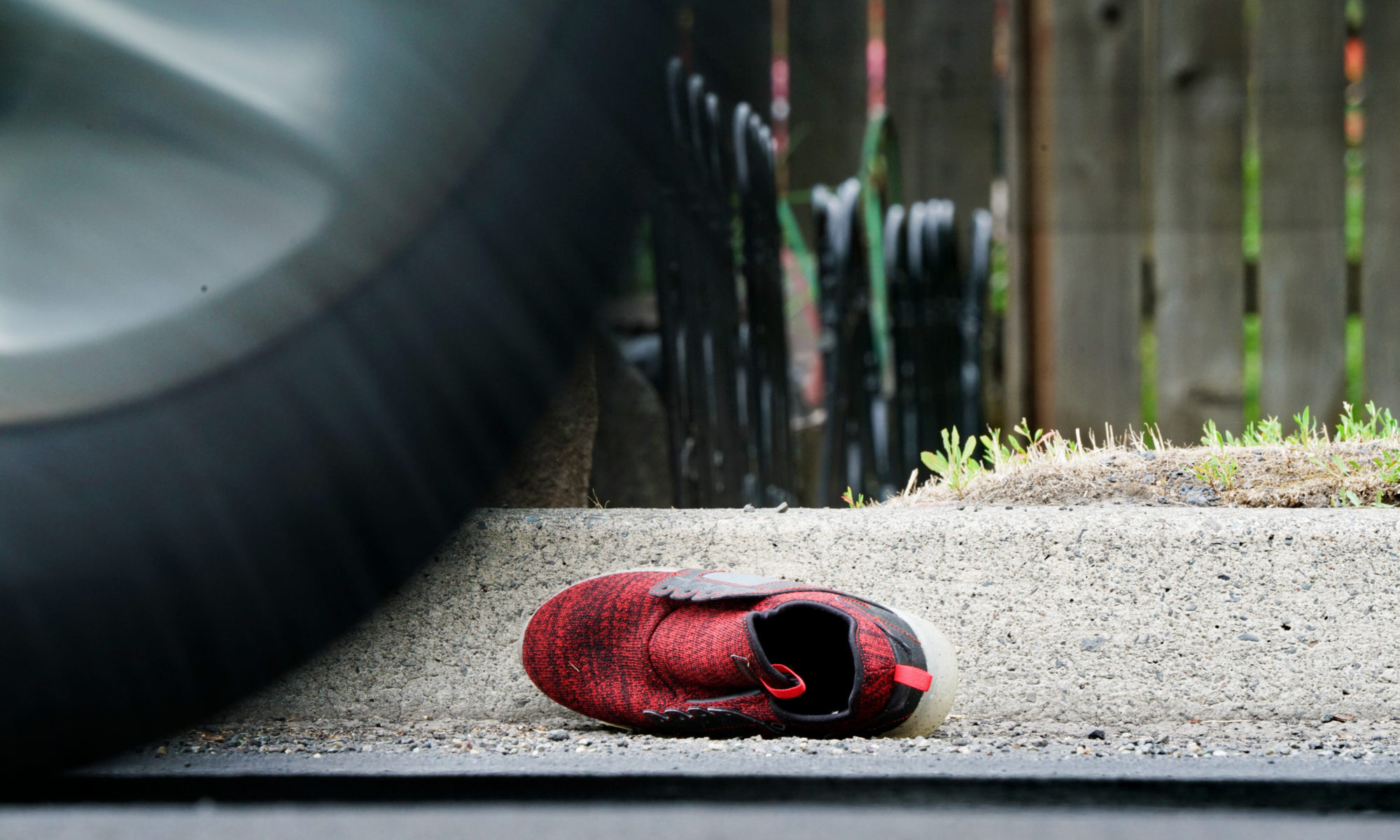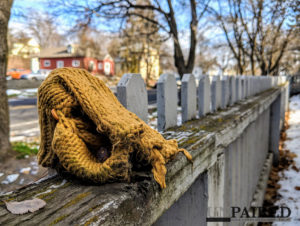As a kid, I remember spending a lot of time feeling not normal. It’s not that I didn’t do kid things. I did. I played football in the side yard and “Risk” on the Family Room floor, but I also spent vast swaths of time reading, or watching TV or just sitting in the corner of a room and observing. I remember discovering, as my self-awareness increased, that this behavior was “different.” I remember becoming more and more isolated at school, more and more quiet at home and less and less comfortable in my skin.
And like most of us, I must have grown out of it.
Or I grew into it.
Either way, I find that I have a special awareness of the quiet, isolated, observing – “weird” – children I sometimes see on my walks.

So, when I passed this boy-sized sock on the grass next to Third Street, and it looked to me like it had been placed on the verge of the street – not dropped, not thrown from a car, not discarded, but intentionally placed – it stayed with me.
And as I continued to see it day after day (I took the first picture perhaps a month after its appearance), I decided to wonder if it had been placed there in service to an investigation, abandoned there in service to a whim and left there in service to, perhaps, an experiment.
~
“Edward! … Edward! Edward!” The woman’s rapid-fire shout projected up and down Third Street and south toward the houses on Howard. She didn’t see Edward – sitting on the grass kitty-corner from their blue house – look up at her. She was standing on the porch. He was thinking about standing up when the woman growled in exasperation and stomped back into the house. Once she disappeared, Edward looked back down at his bare right foot. He was trying to figure out why the top of the knuckle on the second toe hurt. He poked it and discovered a blister. He knew what blisters were. His dad had explained blisters to him. Skin rubs against something over and over and a pocket of liquid forms under the skin. He’d probably pop it later, but why just on that toe? He looked at his foot. That toe was the longest on his right foot. He was about to take off his left shoe when he heard a familiar, quick “hist” and looked up toward the side door of the house. His dad was looking right at Edward. When their eyes met, the smiling man flicked his hand once in a “this way” gesture.
Edward slipped his bare right foot into its shoe and stood up as he watched his dad re-enter the house. The sock he had earlier taken off, turned right side out and flattened carefully onto the grass glowed whitely on the dark green grass. He stepped onto the concrete curb at the edge of the crosswalk.
Time to cross Third Street. He knew how to do this. He looked left. No cars. He looked right. No cars. He looked left again and stepped into the crosswalk. He looked right again as he reached the halfway mark and continued across and onto the sidewalk. He pivoted left and looked further left to begin the process of crossing Howard Street to get to his house on the opposite corner. No cars. He looked right. No cars. He looked left again. There was a car that was going to turn left from Third onto Howard, but he could see the driver smiling at him. He had learned that that smile meant a driver was going to wait for him to cross.
He stepped off the curb and froze when he heard a screech. Not of tires but of “Edward! Stop! You didn’t even look! That car was about to kill you!”
He stood with left foot in the gutter and right foot on the curb as his mother stood on the other curb and shouted apologies to the driver. She waved and waved at the driver until he finally went through with his left turn. All the while she held her left hand up to Edward in a “stay there” gesture. As the car passed, the Edward saw the driver turn to him. The driver smiled and shrugged as he went by. Edward thought that shrug meant the driver thought Edward had done something wrong but wasn’t completely sure.
His mother crossed into the middle of the street in front of a Moscow Police SUV trying to go south on Howard toward Third. She had her “I apologize for my son” smile on her face as she gestured “stop” at the police car to her left and a small yellow car ahead of her and to her right (it was trying to turn right onto Howard.). “Come on,” she shouted. “It’s safe now.” As he was crossing, he turned and saw the huge police officer in the SUV smiling at him. When their eyes met, the officer winked. Edward’s brow furrowed. He wasn’t sure what that wink meant. His mother put her arm on his back and ushered him up onto the curb.
As they entered the side door, Edward pulled his shoes off. He looked down at one sock-clad and one bare foot and said, “Mom, can I see your toes?”
“What? No.” That exasperated growl again as she started down the hall. “You can read for 15 minutes and then I want you to wash your hands for dinner.” He was still looking at his toes as his mother stopped halfway to the kitchen. She said, “On second thought, wash your hands first then read. We’ll keep the library books clean this time.” She started walking again, “Then wash your hands again when I call you. And you’re going to get your homework done perfectly after dinner. I don’t want you getting behind in your first week of third grade.”
Edward turned and walked down the hall toward the bathroom. As he was passing the first door in the hall, he heard “hsst” and turned to see his dad standing barefoot just inside his office. Edward smiled and crouched down to look. His dad’s big toe was the longest. He stood up put his bare right foot toe-to-toe with his dad’s. “Hmm,” he said and his brow furrowed. “Thanks, dad.”
“Sure,” his dad said and Edward started off. “Hey, where’s your other sock.” Edward stopped. There was a thoughtful silence and then he pointed. His dad said, “Outside?”
Edward nodded and said quietly, “Should I get it?”
“Noooo. That would be unwise at this moment.” He looked down at Edward’s feet, “It’s one of the cheap ones I got you so she won’t care unless she notices one bare foot right now. You can get it tomorrow.” He chuckled and said, “Heck, since it’s not one of her organic cotton jobbies, you could probably find it there in March.” Edward’s dad watched his son’s brow furrow in thought before the boy turned and continued toward the bathroom.
“Edward!” his mother shouted from the kitchen. “I don’t hear the water in the sink!”
. . .
On the Sunday before Thanksgiving, Edward, put on his white puffy snow pants, his red, puffy winter coat, his navy blue mittens, his navy blue stocking cap and was about to pull on his navy blue snow boots when he turned and walked down the hall to the first door. “Dad,” Edward said,”can I go outside?”
“In this snow?” Edward’s dad looked up from his laptop computer. “Well, you’d better go or you’re going to get really warm. Where’s mom?”
“She went to the store.”
“How long ago?”
Edward thought for a moment and said, “Ten minutes.”
Edward’s dad’s brow furrowed and after a moment he said, “Okay, Thanksgiving shopping. Can you be back in in 30 minutes?” Edward nodded and turned to leave. “Are you going to put your boots on?”
Edward turned back and Edward’s dad saw the very same “I know you” flat-lipped smirk that his mother used. Then Edward nodded and started down the hall. Edward’s dad was still chuckling a minute later when he heard the side door open and close. “Okay google,” Edward’s dad said. “Remind me to get Edward in 35 minutes.” A voice in the corner of the room said, “Okay. Reminder set.”
Outside, Edward crossed Third Street – look left, look right, look left – crossed Howard Street – look left, look right, look left – walked a few more steps and crouched down at the edge of the sidewalk, facing Third Street. He began to clear the snow from a spot in the area between the sidewalk and the street as carefully as an archaeologist in Egypt. Though no archaeologist would likely use a pink plastic sand castle shovel so seriously.
After about five minutes of digging and clearing, Edward was peering down into a one foot square five inch deep hole in the snow. He could see grass and he could see his sock.
“Whatcha lookin’ at?” Edward turned right and saw empty sidewalk. He turned left and saw a pair of boots like his mom’s church boots, but with more zippers. He looked up from the boots and saw a woman smiling down at him.
“I’m looking at my sock,” Edward said. He turned back to continue looking at his sock.
“Ah. Your sock. Yep there’s a sock there,” the woman said as she crouched down next to him. He looked at her face. She was younger than his mom. Younger than Miss Bain, even.
“It’s an experiment,” Edward said.
“An experiment?”
“I want to see if it will still be here in March. Are you a teacher”
“No, I’m a college student,” she said with a smile. “How long has it been there?”
“I left it on September first,” Edward said. He paused. The woman chuckled and stood up. She was inhaling to say goodbye when Edward said, “Why are you sad?”
“I was just -” the woman took a breath and then said, “Why do you think I’m sad?”
“You have streaks down your face like when my mom was sad at my grandma’s funeral in January.”
The woman quickly pulled out a smartphone and put it in front of her face. “You’re very observant. And I’m sorry your Grandma died. And I’m sad because my friend is sad.”
“Did you make her sad? And it’s okay; she had cancer. And my dad says that I’m that I’m absorbent, too.”
The woman took in a surprised, shaky breath. She swallowed and carefully swiped the side of an index finger under each eye as she said slowly, “observant.” She looked at Edward who had watched her carefully through this process and said, “I’m not sure why I’m saying this to you, but I’m afraid it was at least partly my fault… what happened… why she’s – sad.”
“Did you mean to make her sad?”
The woman said, “God no! I thought…” Her voice trailed off into a small choking noise. Edward’s forehead crinkled in thought.
As the woman’s index fingers ran under her eyelids again, Edward said, “My dad says that when I make my mom mad or sad or mad-sad and I didn’t mean to that I have to kiss her cheek, tell her I’m sorry, and try to fix the sad thing if I can.” He took a breath, “And I have to ‘member what made her sad so I can try to not do it again. My dad says sometimes people don’t even know what will make them sad until the sad thing happens.” After a quick breath he added, “Oh, and you’re not supposed to say the lord’s name in pain.”
The woman looked at Edward for a moment. She smiled slightly and let out an almost inaudible, breathy chuckle. Then she took a deep breath and said, “Can I give you a hug?”
Edward shook his head and said, “That’s one of the things I did that made my mom mad-sad last year so I promised never to hug someone she doesn’t know.”
Edward wasn’t sure what the changed look on the woman’s face meant, but when she held out her right hand he knew to take it firmly – but not too firmly -and shake it up and down no more than two times. She moved off up the street and he crouched back down to look at his sock. After a moment, he began to cover it up with snow again. He didn’t see the woman look back at him before she turned down the steps to a side door on a house a block and a half up Third Street.
. . .
On the day after Christmas, Edward was standing outside the side door of his house, waiting while his mother shouted inside, “Dad! Come on! You need to walk Edward to the park to try his new sled.” Edward wanted to say that he could get to the park himself, but he knew it wouldn’t do any good. Inside, he watched his dad come out of his office and walk down the hall. He pulled his coat off the rack by the door and slipped his feet into his tall brown boots and put his hand on the doorknob. “Aren’t you going to tie those boots,” Edward’s mother said. Edward’s dad kissed her on the cheek and came out the door. He smiled at Edward and gave him the “go on” gesture.
When Edward stopped at the crosswalk on Third Street, clearly intending to cross, Edward’s dad said, “Where we goin’?” Edward looked up, took his hand, looked left, looked right, looked left again and started into the street. He had to lean around his dad to look right again when they reached the middle of the street. They turned left and crossed Howard. Edward pulled them to a stop, crouched down and began to clear the snow away with his mittened hands.
Edwards dad watched the process. He said, “is that a sock?” Edward nodded. “Your sock?” Edward nodded and said, “It’s an experiment.”
“Excellent! What’s your hypothesis?”
Edward knew what hypothesis meant. His dad had explained this word to him. “That I can find it in March.”
Edward’s dad paused for only a moment. “Okay. How long has it been here?”
“Since September first.”
Edward’s dad chuckled as they looked at the sock. “God. That’s one tough sock. Don’t tell your mother I used a bad word.”
“I won’t,” Edward said. He covered the sock with snow, carefully leveling the disturbed area and they went to the park. They never used the sled. When Edward’s dad received the text message about lunch, they were looking at the rings and layers of ice on a puddle of water about 100 yards from the sledding hill.
. . .

On a Monday afternoon in late January, Edward looked out the window in the side door of his house, hoping to see snow. He liked snow. It hadn’t snowed since Christmas. He stared up at the gray sky. Out of the corner of his eye, he saw a movement on the opposite corner. He turned and saw a tall, skinny man standing there. The man pulled something out of his bag… a camera. Hey! He’s taking pictures of my sock, Edward thought. Or he thought he just thought it. “Hey, what?” Edward’s dad said walking up behind him and putting a hand on his shoulder. Edward pointed.
They both watched as the man crouched down and held the camera to his eye for a few seconds. The man stood up and put the camera away.
“Just over five more weeks,” Edward’s dad said. “how’s it doing?”
“It’s dirtier. But it moved.”
“No holes?” Edward’s dad watched the man walk away, west on Third Street. His eyes followed the man and his brow furrowed slightly. After a moment he said, “Moved. How much?”
“No holes. It kind of folded more. In the top part.”
“Maybe pushed down by the snow?”
“Maybe,” Edward said. Then his face scrunched up and after a moment he said, “Yeah, maybe so.”
Edward’s dad reached down and touched a spot between his eyebrows and said, “you’re going to get wrinkles there.” The boy scrunched his face again and after a moment smiled and reached up with a pointed finger. Edward’s dad’s brow furrowed and then he smiled and leaned down. And Edward touched the same spot on his dad’s brow.
“What are you two gawping at?” They turned to see Edward’s mother standing in the hall.
Edward looked at his dad and said, “A man.”
Edward’s dad said said, “With a camera.”
The boy said, “Taking pictures of my sock.” Edward’s dad heard Edward’s mother inhale with dangerous intent and moved quickly.
Edward’s dad said loudly, “Of a scientific experiment in progress!”
Edward said, “Scientific! Yes!”
Edward’s mother growled in exasperation and said, “What in the world are you talking about?”
Edward’s dad said gently, “We were just looking at the world, Moll.” He looked down at Edward and said, “The world?”
The boy furrowed his brow, shrugged and nodded. And the man chuckled, scooped the boy into his arms and stalked toward Edward’s mother.
“What are you -” she said and then her lips flattened into her “I know you” smirk. A moment later, Edward and Edward’s dad each planted a gentle kiss on one of her cheeks. She said, “Go wash your hands. Both of you!”


